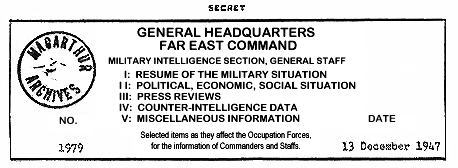
16 December 1947
(b) Origin of 11 families: many foreigners often wonder why the Imperial Family tree of Japan had so many branches and bore so much fruit. Like most other institutions in Japan, this huge family was the natural result of ultra-nationalism and the dreams of empire builders. During the long reign of the Shoguns, the so-called "Imperial Family" sank into poverty and obscurity. It was allowed to maintain a skeleton court at Kyoto, where it was surrounded by a number of retainers who claimed descent from remote imperial ancestors and amused themselves with drink and concubines. As a matter of fact, all Japanese claim to have descended from imperial ancestors but it has never been explained just what makes an ancestor "imperial."
(c) Low state of Dynasty: "In 1868, after a period of 675 years, the sovereign authority was restored to the Throne" is the way the Japanese describe the events of 1868. (b) As a matter of fact, from 888 until the founding of the Empire in 1868, the so-called Emperors were secluded and had no authority except from 1333 to 1336, during a period between shoguns, when the Emperor exercised sovereign authority. (C)
But the hopes of the empire builders rested in the person of a 16-year-old boy named MUTSUHITO who was the Emperor MEIJI. If the future Empire was to be strong and expand it was essential to have a strong dynasty with many members of the Imperial Family.
Two steps were taken by the builders to bolster the weak dynasty which was in danger of extinction. The boy-Emperor was quickly married to a daughter of a court noble. The most influential court nobles were trotted out and accorded imperial status although their claims to imperial dignity were remote and unconvincing. The low state of the dynasty may be understood when it is realized that even with the practices of adoption and keeping of numerous concubines, the entire Royal Family in 1868 consisted of one 16-year-old son of an Emperor and a common woman.
Obviously the empire builders were treading on thin ice; something had to be dome. An adopted son of the previous Emperor was raised to imperial dignity and called "His Imperial Highness Prince KANIN." Then this boys father FUSHIMI Kuniiye, a man who had 16 other sons, was brought forth and given the title of "His Imperial Highness Prince FUSHIMI."
One official account published in 1929 said, "This is the oldest of the princely families, having been founded in the 14th Century by a son of GOHANAZONO Tenno, the 102nd Emperor." (d) But in 11944 the official account said, "the House of FUSHIMI was founded by a great-grandchild of the Emperor GOFUSHIMI, the 93d Emperor." (c)
It is possible that the son of the 102nd Emperor could have been the great-grandchild of the 93d Emperor; but they lived 500 years ago and probably had several thousand descendants in 1868. Then why pick out one of them for imperial status? The empire needed an Emperor and this man had 17 sons. If the 16-year-old Emperor MEIJI died without heirs, then here was a family that might replace him even if it were not related to the Emperor.
This FUSHIMI, who was made His Imperial Highness Prince FUSHIMI, fathered nine of the 11 new Imperial Families which were abolished 14 0ct 47. Five sons became heads of new Imperial Families and four of his grandchildren became heads of new Imperial houses. Thus nine families became royalty 500 years and 22 generations after any of their ancestors had sat on the throne. All of these are now common citizens of a new Japan.